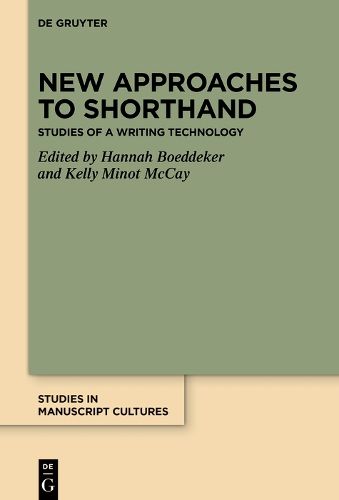Readings Newsletter
Become a Readings Member to make your shopping experience even easier.
Sign in or sign up for free!
You’re not far away from qualifying for FREE standard shipping within Australia
You’ve qualified for FREE standard shipping within Australia
The cart is loading…






This title is printed to order. This book may have been self-published. If so, we cannot guarantee the quality of the content. In the main most books will have gone through the editing process however some may not. We therefore suggest that you be aware of this before ordering this book. If in doubt check either the author or publisher’s details as we are unable to accept any returns unless they are faulty. Please contact us if you have any questions.
Variously identified as an art, a technology, and a professional prerequisite, forms of shorthand have been in use from Antiquity to the modern day. Far from a niche corner in manuscript studies, shorthand represents an almost global phenomenon that has touched upon many aspects of everyday life and of scholarship. Due to its immediate illegibility, however, and the daunting task of decipherment, shorthand has long been neglected as a research object in its own right. The immense quantity of extant and unread shorthand manuscripts has been downplayed, as has the technology's place in cultures of learning, religious devotion, court practice, parliamentary procedure, authorial composition, corporate life, public and private writing, and the academy. As the first ever peer-reviewed volume on the subject, this book presents a much-needed introduction to shorthand, its history, and its disparate historiography, alongside eight contributions by shorthand specialists that showcase some of the many lines of inquiry that shorthand inspires across a range of disciplinary and methodological perspectives. For readers with a vested interest in shorthand, this volume provides a range of approaches to shorthand in the Latin West, from the Middle Ages to the nineteenth century, upon which to orient, substantiate, and inform their own work. For general readers, this publication invites scholars to consider ways in which historically overlooked or underestimated forms of writing facilitated a variety of writing cultures in different contexts, periods, and languages.
$9.00 standard shipping within Australia
FREE standard shipping within Australia for orders over $100.00
Express & International shipping calculated at checkout
This title is printed to order. This book may have been self-published. If so, we cannot guarantee the quality of the content. In the main most books will have gone through the editing process however some may not. We therefore suggest that you be aware of this before ordering this book. If in doubt check either the author or publisher’s details as we are unable to accept any returns unless they are faulty. Please contact us if you have any questions.
Variously identified as an art, a technology, and a professional prerequisite, forms of shorthand have been in use from Antiquity to the modern day. Far from a niche corner in manuscript studies, shorthand represents an almost global phenomenon that has touched upon many aspects of everyday life and of scholarship. Due to its immediate illegibility, however, and the daunting task of decipherment, shorthand has long been neglected as a research object in its own right. The immense quantity of extant and unread shorthand manuscripts has been downplayed, as has the technology's place in cultures of learning, religious devotion, court practice, parliamentary procedure, authorial composition, corporate life, public and private writing, and the academy. As the first ever peer-reviewed volume on the subject, this book presents a much-needed introduction to shorthand, its history, and its disparate historiography, alongside eight contributions by shorthand specialists that showcase some of the many lines of inquiry that shorthand inspires across a range of disciplinary and methodological perspectives. For readers with a vested interest in shorthand, this volume provides a range of approaches to shorthand in the Latin West, from the Middle Ages to the nineteenth century, upon which to orient, substantiate, and inform their own work. For general readers, this publication invites scholars to consider ways in which historically overlooked or underestimated forms of writing facilitated a variety of writing cultures in different contexts, periods, and languages.